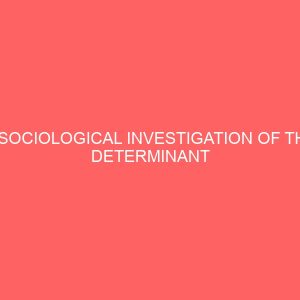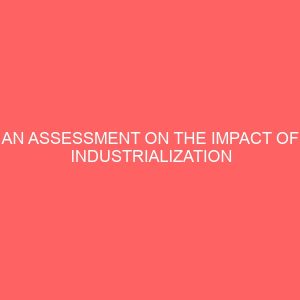Description
CHAPTER ONE INTRODUCTION
1.1 Background to the Study
This project is on Private security companies and crime prevention in Niger state. Human history has always been punctuated with societal concern for security at both the individual and collective levels. This has particularly been the case because security affects peoples livelihood. The privatization of security has now become a global phenomenon (Hyden, 1995). This is the result of a number of factors including general human insecurity, the globalization phenomenon, the privatization of public enterprises, the professionalization of armed and police forces, drive for profit maximization, liberalization of the arms trade, general unending African conflict and the crashing of the twin towers and the pentagon on the 11th of September, 2001 in United States (Holmqvist, 2005). In the contemporary world, the privatization of security has spread throughout the world to an unprecedented level that it is no longer possible to ignore, let alone comprehend (Howe, 1998).
The many types of modern private security outfits available today may be traced to Allan Pinkerton, who founded Pinkertons security services in 1850 with the motto we never sleep (Schmalleger, 1995). It was also the largest of the private firms headquartered in New York. The Pinkerton Service had a logo which was an open eye, to signify constant vigilance on its office doors. The term private eye is thought to have developed from the use of this logo. In another development, Schmalleger (1995) affirmed that Henry Wells and William Fargo built their popularly known Wells Fargo company in 1852 and supplied detective and protective services (private guard and investigator) to areas of West of Missouri.
Thus, much has changed since the early days of private security firms (private policing). Today, services are provided for hospitals, manufacturing plants, communication industries, retirement homes, hotels, casinos, exclusive communities and clubs. Others are nuclear storage facilities and reactors, and many other types of businesses such as information security that aid the protection of personnel.
Following a history of private guards and security practice in Nigeria which could be traced to royalty, religion, social class or pedigree; the practice of private security gradually attracted a deserved attention when it became commercialized and obviously conflicted with the social contract idea which states that only the state is capable of arrest and punishment (Kuna, 1999). Thus, it became imperative that the practice had to be regulated within the confines of duty, definition and laws. For instance, security in the traditional Nigerian society squarely lay with the immediate and extended families; hence any member of the family that violates any of the norms was in danger of being ostracized by the group until reparations and necessary purification and cleansing rituals were undertaken by the family (Igbo, 2007).
Thus, changes have taken place from the traditional Nigerian societies to the present as a result of modernization. These changes occasioned the encroachment of western institutions on moral standards of the society which has implications for general life and security particularly on Nigerians. Other factors include urbanization, formal education and capitalist economic system. As a result a range of crimes emanated quite different from what was known in the traditional society, which may require more sophisticated security approach. Some of these crimes include murder, theft, assault, and suicide, pick pocketing, drug abuse, counterfeiting, fraud, forgery, smuggling, unlawful possession of dangerous weapons, prostitution, white- collar crime, advanced fee fraud (419) corruption, rape, and a host of others which are all prevalent in modern Nigeria(Ebbe, 1981 cited in Igbo, 2007).
Thus, Ochefu and Idrees (2002), posited that, the Nupes and Gwagyis who are predominant groups in Niger state with migrant Hausas prevent crimes through proper socialization of the young ones i.e. application of communal approach to socialization, instilling of the fear of pain in punishment…later, other prevention measures include the organization of the Dogarai (local police), the Ninety (90) days cleansing fast as reparation; Others include the use of scarecrows, charms and fetish materials and the use of Ndakogboya or Kuti (Masquerade) popularly known among the Nupes.
Also, according to Igbo (2007), the end of the civil war witnessed not only the return of old criminals to the street; but also the graduation of new and more sophisticated ones. This singular assertion indicates that the current state of security network in the country may be under serious threat as crime waves continue to rise unabated.
The most recent of the threats to security in Nigeria is the emergence of kidnapping and terrorism which have been enhanced by the widespread use of firearms by criminals. This indeed facilitated the modus operandi of these criminals, thereby enhancing complete change in criminal activities as cases of aircraft hijacking and assassinations of prominent Nigerians and bomb explosions in various corners of the country became rampant.
In addition to earlier mentioned criminal activities, today law and order also pose serious
security challenges in the country. According to Sunday Ehindaro, the former Inspector General
of Police, perhaps the most potent threat to national security of any country is crime
(Dambazau, 2007: 152). This statement is also in line with the report of the Economic Intelligence Unit (EIU) in a survey called ÒRISKWIREÓ which concluded that, Nigeria is an insecure environment for commercial operations. Security risk arises at three levels. The first comes from rising violent crime (from) simple armed robbery (to) carjacking and violent attacks….Second, companies can be subjected to direct attack or blackmail…facilities can be vandalized and staff kidnapped. Third, incidences of inter-communal violence have risen. Nigeria’s ill equipped police force . has been ineffective in stemming the crime wave. (Dambazau, 2007: 53).
Therefore, the ineffectiveness of the Nigeria police and the concern of Nigerians for security led to the emergence of guards and private security companies in the country to augment the activities of the security agencies and work in line with the laid down rules and regulations. Just like the vigilante, private security companies are also an informal arrangement to keep with the pace of rising crime rate in Nigeria.
However, as is the case in all countries, the citizens of Nigeria are highly concerned about their security and this concern has been expressed through the growth of Private Security Companies (PSCs). The last decade has seen a proliferation of PSCs in a country of about 140 million people (Census, 2006). The presence of these companies is conspicuous in the premises of both private and public sector organizations. This is in spite of the fact that in both urban and rural areas, security matters are largely in the hands of private actors than in those of the state. Thus, the function of private security companies was handled by the Nigeria immigration service in the Federal Ministry of Interior. Until 1st September, 2005 when the then Minister of Internal Affairs handed over all documents of private guard companies to the Nigeria Security and Civil Defense Corps (NSCDC, 2009).
There are two principal landmarks in the regulation of PSCs in Nigeria. The first is the enactment and approval for creation of PSCs on 15th December 1986. This law was cited as Act No 43 and consolidated under the laws of the Federation of Nigeria 1990 in chapter 367. The second is the handover from the Nigeria immigration service to Nigeria civil defense corps cited currently as chapter 30 in Private Guard Companies (PGC) Act (Laws of the Federation of Nigeria, 2004). This law is specifically enacted for the regulation and licensing of private guard companies which must be wholly owned by Nigerians and other matters-ancillary thereto (PGCs Act, Cap367, 1990).
Finally, the perception of ineffective policing and rising crime gave impetus to the emergence of a plethora of non-state policing groups (Olaniyi, 2005). The state has shared its security responsibility with a variety of non-political organizations including vigilante groups, religious vigilante, ethnic militias and private security guards.
Based on the above and most especially considering its growing importance, the activities of the PSCs necessarily became a subject of study. This has led the researcher to the choice of private security companies and crime prevention in Nigeria with Niger state as a case study.
1.2 Statement of the Problem
Law, order and security were maintained in the pre-colonial societies through thorough socialization of members of the society using peer group, age grade and religious institutions (Ogunbameru and Rotimi, 2006). Thus, violators of societal norms, customs, and traditions of various communal groups faced serious sanctions which ranged from ostracizing, payment of reparation and purification and consequently the performing of cleansing rituals (Igbo, 2007). For instance in Niger state, criminals pay for their crimes through serving various punishment such as digging of dungeons, working in the EmirÕs farm, quarrying, and in cases which involve witchcraft and murder, banishment or ninety (90) days cleansing fast was observed as reparation (Idrees and Ochefu, 2002). The occurrence of these crimes was often at a lower rate because these sanctions also helped in inducing fear into the people on the negative consequences of committing crime in the society.
These roles changed during the colonial era following the introduction of formal social control. The Native Authority (NA) police assumed the role of maintaining law, order and security, while the citizens simply became on-lookers because community security was seen as the responsibility of the government. At this point, insecurity also started growing due to the nature of native administration. This is because Nationalist activities were seen and conceived of as an attack on the colonialists (Kuna, 1999). Therefore, the brutality of the NA police became instrumental to the growth of the nationalist movement at this time in the society.
During the post-colonial era, especially after the civil war in Nigeria, the activities of criminals grew almost out of hand as a result of the proliferation of firearms which were found in all nooks and crannies of the country. This hastened the growth of crime on the one hand, and also brought about the need to further secure the urban communities where robbery and the nefarious acts of criminals were frequent. Therefore, urban areas like Lagos, Ibadan, Enugu, and Kano started having neighborhood guards due to the inefficiency of the police (Dambazau, 2007; Igbo, 2007)
In describing insecurity in Nigerian urban cities, Osahon (1996 in Dogon-yaro, 1996) stated that:
Actually we are under severe siege already as a people. Fear now rules our daily lives. Ugly, harrowing fear of the known and unknown. When we go out in the mornings, we are not sure we will return home safely and with our cars and other property including even the shoes on our feet or the earÂring in our ears. If we are lucky to arrive to find our homes unraided in our absence, we sleep with one eye open expecting the worst any moment of the night. In other words, we do not sleep any more. in our ability to perform daily activities (Dogon-yaro, 1996:224).
This situation also existed in other growing cities in Niger state such as Minna, Kontagora, Bida, Suleja, and a few other towns. The public response to perpetual fear and insecurity was to take laws into its own hands. In July 1987, butchers, traders, and unemployed persons in Minna vented their wrath over police harassment, intimidation, and extortion in a six- hour rampage against police and soldiers that was quelled by military units (The library of Congress Country Studies and CIA Factbook, 1991).
Again, in May, 2009, two lecturers from School of Nursing Bida were bathed with acid in their staff quarters by students suspected to have been withdrawn by the institution for having failed in all their first semester examinations. It was noted that the staff quarters lacked security guards unlike the school premises and the culprits were not apprehended (Sunday Trust, May 17, 2009). However, in July, 2009, Newline news paper reported that, the family of one Mr. James Omeize, the proprietor of Brighter International School in Minna was kidnapped in Minna and the kidnapper demanded 20 million naira for his release in far away Benin City in Edo state.
Other insecurity instances abound in the state as many cases are not even reported to the police or captured by any vigilant watch dog. The Nigeria police has always came under severe criticism; being accused of falling victims to every negative unfavorable character, devoid of any measure commensurate to their oath of office. In other words, this weakened capacity of the Nigeria Police to fight crime (i.e shortage of staff, obsolete equipment, corruption, defective training programmes, police discretion etc.) has led to increase in other policing agencies across the country over the years. It is due to the importance attached to security of lives and property that both the professional and non-professional security outfits came into existence in these urban centers.
After about two decades of the flourishing of private security industry in Niger State, it appears PSCs have not received much scholarly attention in terms of the services they provide. One wonders if the seeming increase in the number of private security companies in Niger state is caused by the desire for improved security or other ulterior motives. It is in the light of the above problems, that this research work is aimed at examining the private security companies in Niger state.
1.3 Research Questions
The following research questions are formulated to guide the study:- I. How were the security needs of the people in Niger state provided during the traditional era?
II. What factors necessitated the establishment of PSCs?
III. How effective are these PSCs in their security functions?
IV. What are their major constraints in carrying out these functions?
V. What are the strategies for overcoming these constraints in order to make them more
efficient?
VI. What is the relationship between PSCs and the Police?
1.4 Research Objectives
The general objective of this research is to determine how effective private security companies are in crime prevention in Niger state.
The following are the specific objectives of the research;
I. To find out how security needs of people in Niger state were provided during the traditional era.
II. To determine the factors that necessitated the establishment of PSCs
III. To assess the effectiveness of these PSCs in their security functions
IV. To examine the major constraints of the PSCs in carrying out their functions.
V. To identify the strategies for overcoming their constraints for efficient service delivery.
VI. To examine the relationship between PSCs and the Police
1.5 Significance of the Study
This study has both theoretical and practical significance.
(a) Theoretical significance: this study will contribute to existing literature on PSCs/PSGs especially in the area of crime prevention in Nigeria. The study will also provide the baseline information on typologies of crime prevention in Niger state and stimulate research in the field by other researchers and academicians. Moreover, the study will provide reference document to other scholars who want to engage in studies of PSCs and crime prevention.
(b) Practical significance: the findings of this study will enhance the understanding of policy makers on strategies and dynamics of crime prevention companies. This will lead to a design of programmes that will enhance crime prevention and improve security of lives and property in Niger state. This study is also significant for the fact that the findings will assist in extending and deepening the understanding of policy makers to improve crime prevention through the PSCs. This will reveal, if any, the challenges of working with wide range of Private Security Companies and provide suggestions on how the challenges identified can be overcome.
1.6 operationalization of Concepts
The following terms are used in this research and are defined based on their usage in this context. Beneficiaries: Refers to individuals, private and public enterprises, ministries, agencies, directorates etc. who subscribes to the services of the PSCs.
Crime: Refers to wrongdoing that threatens the security or well-being of society and usually considered an act (evil) punishable by law.
Crime Prevention: It refers to a pattern of attitudes and behaviors directed both at reducing the threat of crime and enhancing the sense of safety and security to positively influence the quality of life.. .and to develop environments where crime cannot flourish
Formal Security Sector: Refers to police and the army which the constitution of a country formally recognizes for the defense, peace, total security and integrity of the country.
National Security: Refers to safeguarding the interest of the citizenry and providing the type of atmosphere that is free of threats that could inhibit the pursuit of the good of all. It is about the processes and measures required to preserve law and order.
Private Security: Refers to those self-employed individuals and privately funded business entities and organizations providing security -related services to specific clientele for a fee, for the individual or entity that retains or employs them, for themselves, in order to protect their persons, private property or interests from various hazards.
Private Policing: This refers to the performance of policing functions by individuals or agencies other than those directly owned and controlled by the state.
Security: This means protection from physical or direct violence, and freedom from fear; a sense of safety and relative wellbeing in political, legal, socio-economic and cultural terms, it is also, a measure of protection from structural violence and security of lives and properties as enshrined in the constitution of the Federal Republic of Nigeria.







